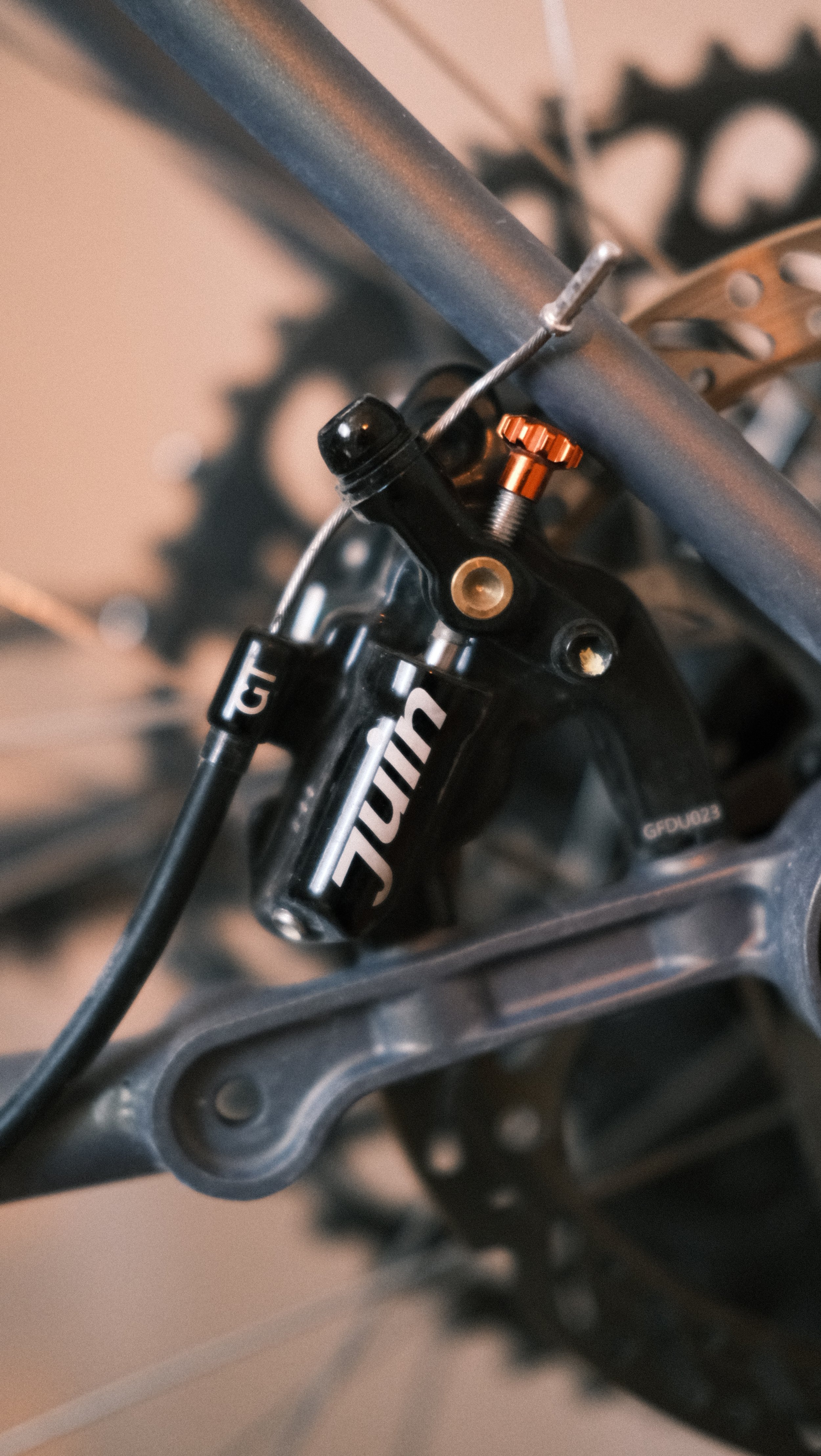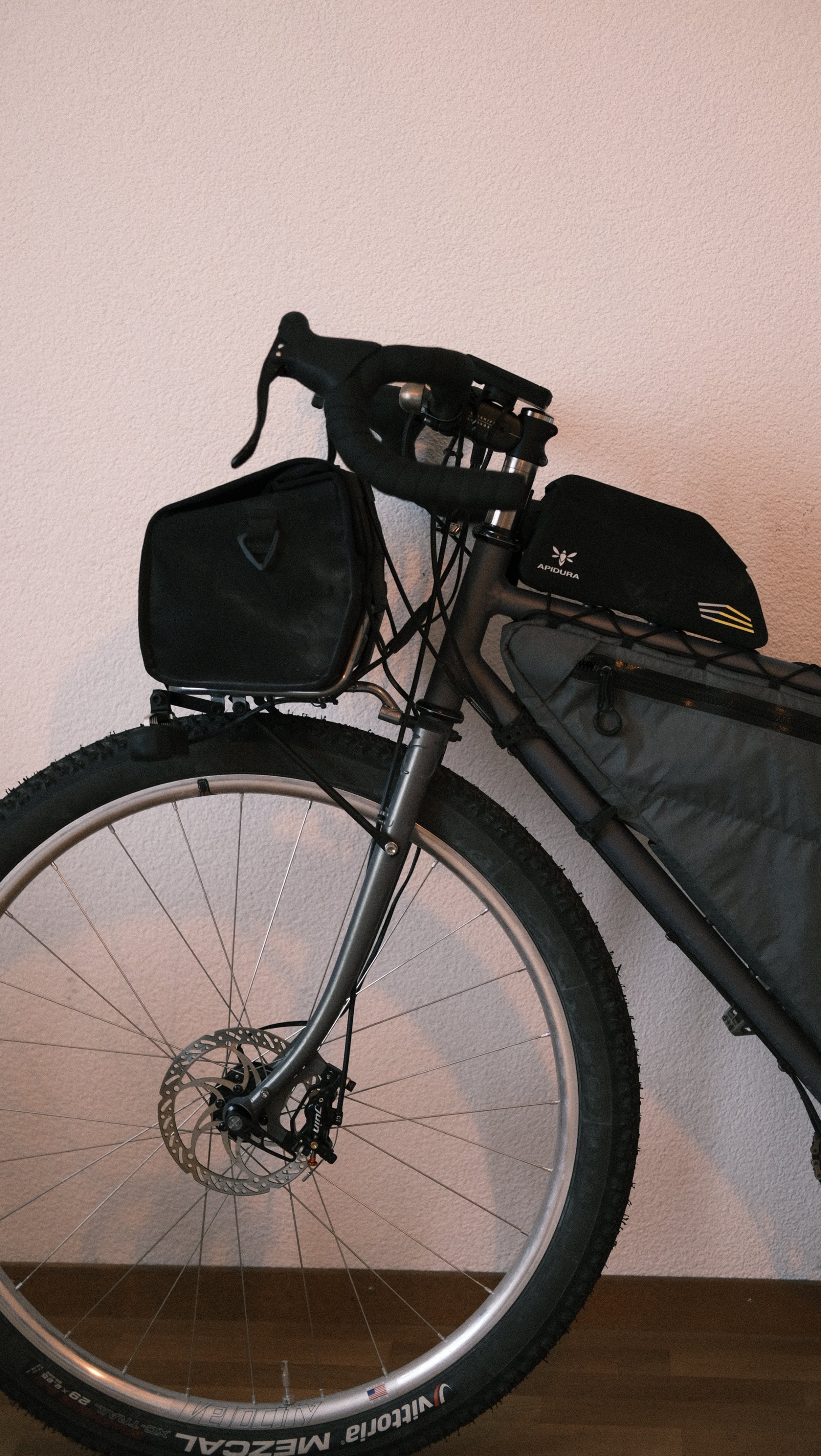Juin Tech GT Review
Today, let's take a look at a hybrid from the world of components: the Juin Tech GT. A semi-hydraulic brake caliper with 4 pistons.
What this means and how these brakes compare to the traditional solutions on the market can be read below:
Technical Specifications:
4-piston caliper (hydraulic) mechanically operated via a Bowden cable
Compatible with Short-Pull levers (e.g., STI levers)
Available in Flat Mount or Post Mount
Price: €291 (as of December 18, 2023, purchased from Bikesmith.de)
Please note that prices may have changed since then.
As always, please note that English is not my native language. There may be some grammatical errors here and there. Please excuse this, as I am working to improve my skills.
I first came across the Juin Tech brakes through an article on Bikepacking.com. In the USA, they are marketed under the Yokozuna brand but are actually made by Juin Tech in Taiwan. Back then, I found it intriguing that such a brake even existed. The brake is actuated at the brake lever by a regular brake cable (thus, mechanically), but the brake pistons inside the brake itself are hydraulically operated.
A few years later, I built my own gravel bike with the aim of riding extensively on gravel and touring in foreign countries. For this purpose, I wanted to have reliable and high-quality brakes on board. My consideration back then was relatively straightforward. I wanted the bike to be kept relatively analog and simple, and what's simpler than mechanical disc brakes? You pull the brake lever, the cable pulls, the brake pistons press against the disc, and you slow down. In theory, it's straightforward, so I started with very basic TRP Spyre brakes that I had lying around. Now, there are many who would like to intervene here. There's a relatively large faction for whom hydraulic disc brakes are completely unbeatable. More braking power, less force needed at the brake lever (ability to brake with 1-2 fingers), and much better modulation of braking force. I'd like to delve into this discussion further in a separate post later on, so let's take a shortcut today. For me, a mechanical disc brake gives me a better feeling, especially when bikepacking and touring outside the German-speaking region. Why? Because a brake cable is available practically everywhere and can be replaced on my bike within 2 minutes. On the other hand, not every bike shop (I've experienced this myself) has a bleed kit for hydraulic brakes. In summary, I prefer the low-tech option for my trips. However, I must admit that mechanical brakes are not flawless either. Especially the TRP Spyre disappointed me relatively quickly. The braking power is so-so, and the adjustability on my frame in combination with my gearing (SRAM GX Eagle) is quite fiddly (adjusting a screw to set the inner brake pad distance is difficult due to the size of the cassette and the position of the Flat Mount brake).
So, I reached for my credit card, looked around, and ordered the Juin Tech GT. Mechanical actuation with hydraulic braking power and modulation? Yes, please, I thought to myself. But can the brake deliver what it promises?
BUILD
I find the Juin Tech GT impressive with its very simple yet well-thought-out design. It comes factory-set for 160 mm brake discs, which I appreciate because let's be honest, there's no reason to use brake discs smaller than 160 mm. Hence, the caliper (in Flat Mount) comes without any adapters by default, giving a cleaner appearance.
Mechanical brakes, unlike hydraulic brakes, do not self-adjust the distance between the brake pads. Therefore, every few hundred kilometers, you'll need to adjust them using the screw with the orange head (moving it further inward). However, with Juin Tech's GT brakes, this is incredibly simple and realistically takes less than 10 seconds. It doesn't need to be done too frequently. This feature also allows fine-tuning of the brake to personal preferences as the lever's necessary length for brake activation can be adjusted once some of the brake pad has worn down.
Brake pads can be easily and conventionally replaced. Shimano D Type brake pads can be used as replacements.
There's a visible bleed port, but the system is supposed to function without bleeding. The manufacturer advises against performing any self-maintenance in this regard. More on this later.
FUNCTIONALITY
Right from the first ride, it was evident to me that the Juin Tech GT is likely worth its relatively high price. Usually, disc brakes (the brake pads) need some time to "bed in," but for me, the GT worked flawlessly from the get-go. And indeed, quite impressively.
The braking power is outstanding. You can bring the wheels to a complete stop without exerting excessive force, providing a lot of confidence if you need to stop suddenly. The modulation is also fantastic, and let me say it upfront—it's far better than that of hydraulic brakes, in my opinion. The braking force can be modulated really well and is delivered evenly; braking with 1-2 fingers is easily achievable. This is where the case for the simple mechanical actuation coupled with hydraulic braking power and even better modulation truly shines.
However, during a bikepacking trip through Tuscany this past summer, I encountered the downside of this system. During a steep and prolonged descent in around 38°C temperatures, the front brake overheated, and since then, it has produced a specific noise when braking. This issue occurred again during another steep descent in similar temperatures. Because there's no expansion reservoir in the brake, heat management is crucial. In my case, the brake fluid expanded so much that the front brake caliper started braking without my actuation of the brake lever. This is, of course, a major issue and a potential hazard, but it hasn't recurred, and I remain vigilant. There are a few reports online about this issue, none involving accidents but resembling what I described above. The suggested solution is to release 1-2 drops of brake fluid from the caliper to give the fluid some extra room. I plan to try this in the future as I'm relatively certain it will solve the problem. Nonetheless, this issue somewhat limits my praise for the brakes. So, let's summarize.
POSITIVE ASPECTS
Excellent braking power, as good as any hydraulic brake I've used so far.
Better modulation of braking force than hydraulic brakes, the best feeling I've ever had at the brake lever.
Brake pad adjustability is well-designed and very easy.
Sleek appearance, especially for the Flat Mount variant where no adapters are needed.
The brake calipers are very lightweight (298 g for the pair).
NEGATIVE ASPECTS
The system can experience problems in high heat, necessitating the need to take breaks during descents to allow the brakes time to cool down.
At €300 for the pair, they are by no means cheap.
Not easily repairable on a tour.
CONCLUSION
In my mind, there's a sort of conflict regarding the Juin Tech GT. On one hand, they perform perfectly, and I would love to write that I can wholeheartedly recommend them to everyone. However, I cannot reconcile this with my conscience. I think the GT brakes are exclusively for experienced riders who don't mind paying attention to their braking behavior and know when issues might arise, or for those who don't frequently tackle descents with over 1000 meters in elevation or ride with a lot of gear. It's unfortunate because, in my opinion, we're very close to perfection here. I'll also provide this feedback to Juin Tech, hoping for a better system in the future that addresses the heat issue.
I hope you enjoyed reading my test, and as always, if there's anything specific that interests you, please let me know.
With these words, Happy New Year to all, and may everyone have a healthy year ahead!






